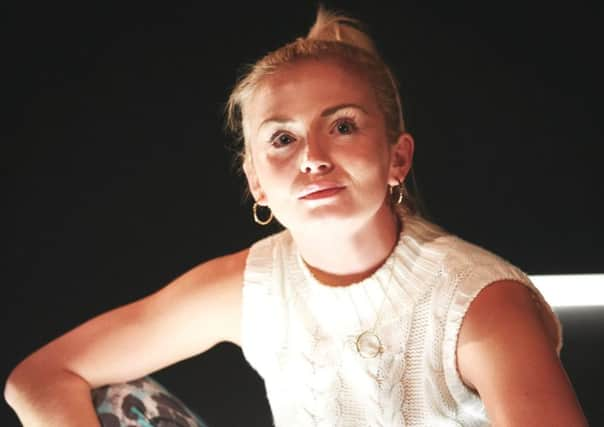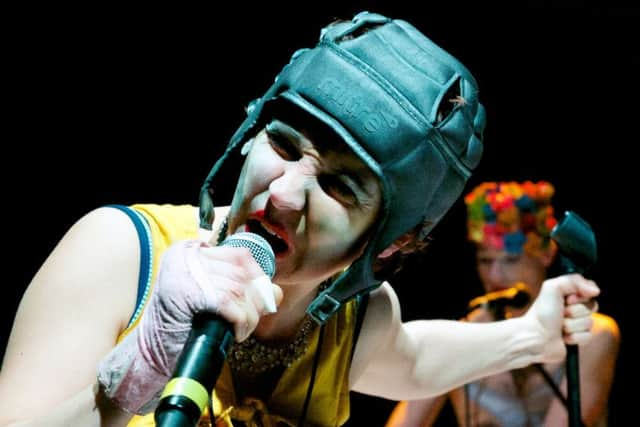Festival shows tackling pressing social issues


From the demonisation and writing-off of the poor, to the power of offshore tax havens, to the broad range of relevant issues tackled by the Theatre Uncut strand, fans of theatre that is angry and unafraid of taking a side should be excited.
When it premiered in Cardiff the day after May’s General Election, Iphigenia in Splott was effusively described by the Guardian as being: “The most shattering, angry call for immediate revolt that you will see on stage this year.” Written by Gary Owen, who previously wrote Crazy Gary’s Mobile Disco and the Fringe First-winning The Drowned World for Paines Plough, and directed by Rachel O’Riordan – sometime artistic director of Perth Theatre, now at Sherman Cymru – it stars Sophie Melville as Effie, a young woman from the Cardiff suburb of Splott with no prospects or future.
Advertisement
Hide Ad“It’s the story of a young woman who essentially sacrifices herself for the common good and takes a decision in her life which should result in respect and gratitude from the rest of society,” says O’Riordan, noting that the title of this monologue is a reference to Euripides’ Iphigenia in Aulis, in which Agamemnon sacrifices his daughter so that his troops’ boats may sail well. “But it doesn’t. It’s really social commentary, it’s about how the people at the bottom of the pile have very little power, and so we’re very careless as a society with this demographic; young women and young men who are uneducated and therefore not empowered to make the necessary decisions


“It’s sad and its vicious. It’s funny on occasion but it’s quite political. I think it’s like an iceberg play, it’s a very simple story on top but underneath its saying something about the world we live in right now and it’s also imagining what might happen if we keep going the way we’re going. It’s unflinching in showing us what we already know but that we might try and avoid. There are too many Effie’s out there, that’s the tragedy of it. It’s a tragedy of wasted talent, brains, verve and life, and I think it’s increasing all the time, because it’s becoming increasingly difficult to function in this society if you don’t have a head start. The way more vulnerable people are being treated by the general distribution of wealth is going to create an underclass which is ignored and pushed under.”
At the opposite end of the spectrum from Effie live the subjects of Caroline Horton’s Islands, inspired by the prevalence of offshore tax havens in finance, and her unfolding discovery of what that means for the economies of nations.
“It was inspired by the frustrations of not really knowing what had gone wrong during the financial crash in 2008,” says Horton, “and reading layman’s books by people like John Lanchester which explained it some more. In doing so, it was the role of offshore accounting which horrified me most.”
Horton says she had always thought of these tax havens as being benign places in which rich people kept their money. “They don’t really hurt me or anyone else,” she’d always thought, “but what’s become clearer over the last few years is how accepted it is by multinationals and wealthy individuals that they should pay minimum tax. It’s become very prevalent, the acceptance that this is how things are done and that we must do everything big business asks because we don’t want to offend them. We have an amazing ability as humans, if we can’t see or feel the consequences of something bad, then we’re okay with it. It’s like knowing a war is happening far away.”
Her aim with Islands, she says, is “dirtying the image” of this practice, to a degree. “It’s about pushing the feeling of ridicule and discomfort and disgust that you feel that world should trigger,” she says. “The director and I both studied in France, we’re fans of the grotesque form of bouffon theatre, so this play is about a gang of crude, childish have-nots who come to the city sometimes and shake their fists at the injustice of the world. It’s vicious and funny – there’s a rage there, yes, but a dark humour too. Like, isn’t it unbelievable that this is allowed to go on? By us lot, I mean. Great, I’ve made a play, but not many of us actually protest this.”
Advertisement
Hide AdFinally, the return of Theatre Uncut, this time to Summerhall, sees a “best of” compilation of six plays in six days from writers Clara Brennan, Vivienne Franzmann, Kieran Hurley, Dennis Kelly, Neil LaBute and Stef Smith, staged by artistic directors Emma Callander and Hannah Price to celebrate the strand’s fifth birthday.
“When we began we wanted to protest, illuminate and examine the cuts being made to welfare spending by the government,” reflects Price. “We wanted Theatre Uncut to use theatre, the medium we love, to do so and the resulting plays to reach as many people as possible. It all sounds so worthy like that, but it’s difficult to overstate how angry I was about what was taking place, and how Theatre Uncut was a coming together of people who felt the same.”
Advertisement
Hide AdShe goes on to explain why she believes in the existence of the project. “Politics can seem removed from the personal,” she says. “Theatre undoes that. You can take a governmental policy and give it a face. It’s an imaginative leap, but theatre always creates empathy, and if you’re directly empathising with a person you can’t depersonalise the argument.”
O’Riordan agrees with this sentiment, and describes why she believes the political element is so compelling in theatre. “There’s something about the visceral nature of a live person standing in front of you, where you buy into this imaginary world and they say things that shake you. The live arts are vital to our society. Even before the Greeks, humans have wanted other humans to tell them stories about themselves, it aids our understanding and that can only be a good thing.”
l Iphigenia in Splott is at Pleasance Dome until 30 August. Today 1:50pm. Islands by Caroline Horton is at Summerhall until 29 August. Today 2:05pm. Theatre Uncut is at Roundabout at Summerhall until 30 August. Today 10am.